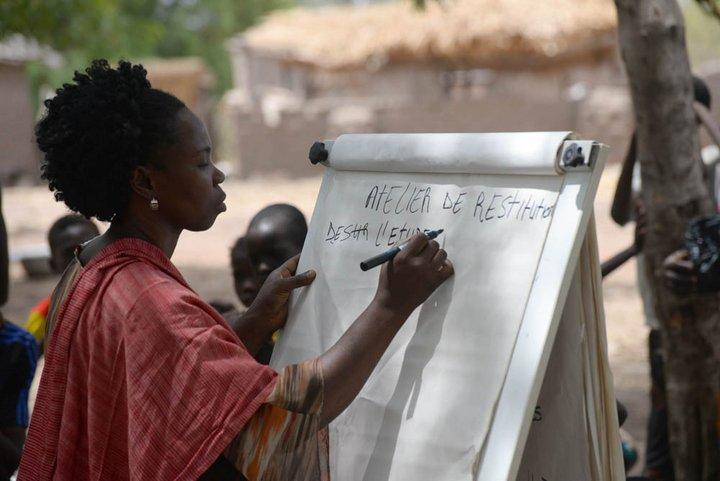Research Articles Women’s shifting rights to precious tree resources in Burkina Faso

Néré plays a significant role in the diet of rural and urban populations in Burkina Faso’s Sudano-Sahelian zone. Although women are the ones to harvest néré seeds for income and direct consumption, they have no secure access to tree resources. Moreover, the density of néré is declining because of threats hindering its regeneration, including population growth and the expansion of cultivated crops in an extensive agrarian system. In a condition of resource scarcity and increasing demand, changes in women’s use and access rights are taking place.
By Barbara Vinceti, Scientist
Néré (Parkia biglobosa)—the African locust bean—is a very important tree species not only in Burkina Faso but across West Africa. It plays a significant role in the diet of rural and urban populations in Burkina Faso’s Sudano-Sahelian zone. The fruit provides seeds, which women process into a highly nutritious sauce (soumbala) that is eaten with grain-based dishes. Although women are the ones to harvest néré seeds for income and direct consumption, they have no secure access to tree resources. Moreover, the density of néré is declining because of threats hindering its regeneration, including population growth and the expansion of cultivated crops in an extensive agrarian system. In a condition of resource scarcity and increasing demand, changes in women’s use and access rights are taking place.
Catherine Pehou, a young researcher from Burkina Faso, shared her findings on shifting access rights to néré in a session on 'Adoption, innovation and gender perspectives' at the annual Tropentag conference held in Vienna from 19-21 September, 2016. Pehou analyzed the dynamic nature of women’s access rights and control over néré in three villages in Central-West Burkina Faso, inhabited by autochthonous (Nouni) and migrant ethnic groups (Mossi and Fulani). Through a mix of methods including participant observation, Catherine mapped the access rights of 180 women to 400 néné trees.
Pehou found that access rights are considerably differentiated based on a hierarchical system defined by ethnicity and position in the household. Access rights also vary based on the type of land use. While women’s harvesting rights tend to be more secure and uniform in communal forest land, in areas within the boundaries of the household or in areas attributed to a particular lineage, women can easily lose their access rights to néré when these are transferred through inheritance, renting, lending and sale of the land. Competition for the resource is growing considerably as its abundance decreases and its market value grows. Women’s fragile access rights to prized resources such as néré must be carefully considered in any policy, private, public or development intervention to create socially just development and conservation options.
- Watch a short video about the project: Néré – a multipurpose tree
- Download Catherine Pehou's presentation: Access to forest resources: Women’s rights to Parkia biglobosa in three villages in Central-West Burkina Faso
- Policy brief: Préserver le Néré pour renforcer la sécurité alimentaire au Burkina Faso by Catherine Pehou, Barbara Vinceti and others
- Learn more about Bioversity International at Tropentag 2016
This research has been conducted under the supervision of CIFOR within the framework of a project coordinated by Bioversity International, focused on threats to food tree species in Burkina Faso, funded by the Austrian Development Cooperation, and implemented in collaboration between national partners and partners from the CGIAR Research Program on Forests, Trees and Agroforestry (Bioversity International, CIFOR and ICRAF).
Photo: Catherine Pehou, a young researcher from Burkina Faso. Credit: Bioversity International/B. Vinceti
